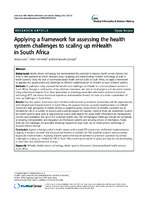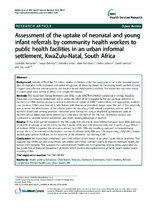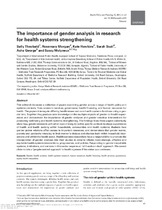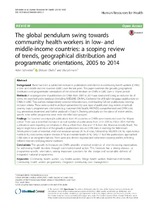| dc.contributor.author | Leon, Natalie | |
| dc.contributor.author | Schneider, Helen | |
| dc.contributor.author | Daviaud, Emmanuelle | |
| dc.date.accessioned | 2013-02-27T18:40:42Z | |
| dc.date.available | 2013-02-27T18:40:42Z | |
| dc.date.issued | 2012 | |
| dc.identifier.citation | Leon, N; Schneider, H. & Daviuad, E. (2012). Applying a framework for assessing the health system challenges to scaling up mHealth in South Africa. BMC Medical Informatics and Decision Making, 12:123 | en_US |
| dc.identifier.issn | 1472-6963 | |
| dc.identifier.uri | http://hdl.handle.net/10566/552 | |
| dc.description.abstract | Background: Mobile phone technology has demonstrated the potential to improve health service delivery, but
there is little guidance to inform decisions about acquiring and implementing mHealth technology at scale in
health systems. Using the case of community-based health services (CBS) in South Africa, we apply a framework
to appraise the opportunities and challenges to effective implementation of mHealth at scale in health systems.
Methods: A qualitative study reviewed the benefits and challenges of mHealth in community-based services in
South Africa, through a combination of key informant interviews, site visits to local projects and document reviews.
Using a framework adapted from three approaches to reviewing sustainable information and communication
technology (ICT), the lessons from local experience and elsewhere formed the basis of a wider consideration of
scale up challenges in South Africa.
Results: Four key system dimensions were identified and assessed: government stewardship and the organisational,
technological and financial systems. In South Africa, the opportunities for successful implementation of mHealth
include the high prevalence of mobile phones, a supportive policy environment for eHealth, successful use of
mHealth for CBS in a number of projects and a well-developed ICT industry. However there are weaknesses in other
key health systems areas such as organisational culture and capacity for using health information for management,
and the poor availability and use of ICT in primary health care. The technological challenges include the complexity
of ensuring interoperability and integration of information systems and securing privacy of information. Finally,
there are the challenges of sustainable financing required for large scale use of mobile phone technology in
resource limited settings.
Conclusion: Against a background of a health system with a weak ICT environment and limited implementation
capacity, it remains uncertain that the potential benefits of mHealth for CBS would be retained with immediate
large-scale implementation. Applying a health systems framework facilitated a systematic appraisal of potential
challenges to scaling up mHealth for CBS in South Africa and may be useful for policy and practice decision-making
in other low- and middle-income settings. | en_US |
| dc.language.iso | en | en_US |
| dc.publisher | BioMed Central | en_US |
| dc.rights | © 2012 Leon, et al; licensee BioMed Central Ltd.This is an Open Access article distributed under the terms of the Creative Commons Attribution License, which permits unrestricted use, distribution, and reproduction in any medium, provided the original work is properly cited. | |
| dc.subject | mHealth | en_US |
| dc.subject | Mobile phone technology | en_US |
| dc.subject | Health systems framework | en_US |
| dc.subject | Community-based health services | en_US |
| dc.subject | South Africa | en_US |
| dc.title | Applying a framework for assessing the health system challenges to scaling up mHealth in South Africa | en_US |
| dc.type | Article | en_US |
| dc.privacy.showsubmitter | false | |
| dc.status.ispeerreviewed | true | |
| dc.description.accreditation | Web of Science | en_US |




